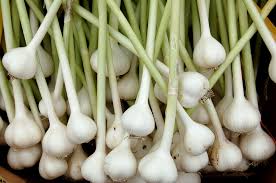History of Garlic. Where did it come from?
The word garlic derives from Old English, garlēac, meaning gar and leek as a “spear-shaped leek”
- Garlic is believed to be originally native to Central Asia as this is where it can currently be found growing wild.
- Evidence from historical records suggests that garlic has been cultivated for at least 5000 years.
- It is the most common ingredient in food today worldwide but few people realize that garlic is one of the oldest known horticultural crops.
- In ancient China, garlic was prescribed for respiratory ailments, digestive issues, diarrhea, and parasites. It was also used in combination with other herbs to treat fatigue, impotency, headaches, and insomnia.
- Surprisingly, garlic was frowned upon by foodie snobs in the United States until the first quarter of the twentieth century, being found almost exclusively in ethnic dishes in working-class neighbourhoods. But, by 1940, America had embraced garlic, finally recognizing its value as not only a minor seasoning, but as a major ingredient in recipes.

What is garlic?
- Garlic grows underground in the form of a bulb. (Its long green shoots produce flower stalks called scapes which can be eaten.
- It is covered in an inedible papery skin, the bulb and is comprised of individual sections called cloves, and there can be anywhere from 10 to 20 cloves per head.
- These cloves are themselves enclosed in a paperlike skin, which needs to be removed, and the pale yellowish flesh within is the part of the garlic that is used in cooking and can be cut in a variety of ways.
- It is inexpensive and is used as a flavouring ingredient in recipes rather than as the main ingredient itself.
Why is garlic important?
Cold and Flu
- Garlic is still used to combat sickness and even the common cold.
- It is known to help boost the function of the immune system. The garlic plant’s bulb is the most commonly used part of the plant.
- Taking 2-3 cloves of raw or cooked garlic a day or sipping some garlic tea (with a touch of honey or ginger to lift up the taste) is not only going to relieve a stuffed nose and cure a cold but also build your immunity.
https://www.southernexposure.com/blog/2017/09/a-brief-history-of-garlic/ https://www.thespruceeats.com/all-about-garlic-995693 https://www.intechopen.com/books/antioxidant-antidiabetic-agents-and-human-health/garlic-and-its-effects-on-health-with-special-reference-to-the-reproductive-system https://www.thespruceeats.com/history-of-garlic-1807602


Great points about food and class/status …